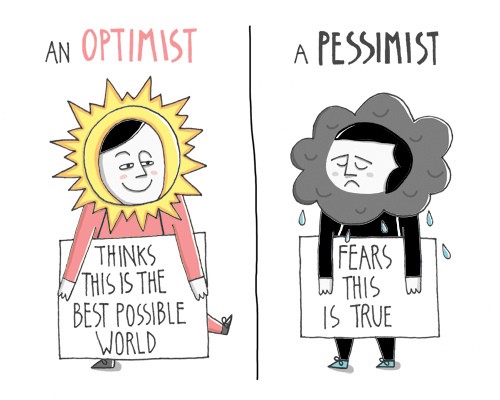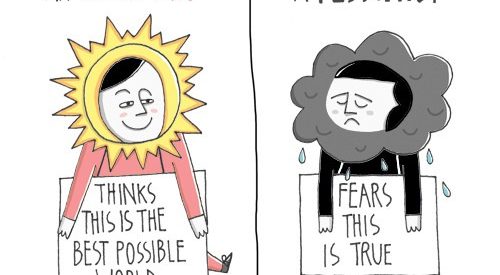
When someone is being interviewed, it is quite common for them to be asked if they are an optimist or a pessimist. What is quite strange, however, is that this question, regardless of what you actually are, has a correct answer: ?I am 100% optimistic!?
Why is it that we value optimism over pessimism?
Where does realism come into play?
What am I?
To begin answering these questions we must first get a little background knowledge on these mentalities. Optimism is when a person is more likely to look at the positives in a situation. They are commonly found saying things like ?it could have been worse? and ?well at least??. Pessimism is when a person is more likely to look at the negatives in a situation. they are often found saying things like ?if only I had? and ?I should?ve??. Now it is clear to see why people tend to prefer optimists over pessimists. Put simply, an optimist will keep everyone happier by constantly pointing out what was done right and well, while a pessimist will only look at what went wrong and what could be improved. One must see the value and necessity of Pessimists though. If you had a project team full of very optimistic people. they would make very slow progress after their first concept because, rather than looking at what could be done better and being critical of their work, they would sit around patting each other on the back for what they have done right. However, This doesn?t mean that pessimism is the way to go. If you had a project team full of pessimists they wouldn’t get very far past their first concept because when everyone is pointing out faults and mistakes it leads to discouragement and a lack of motivation which would cause the team to work slowly or even disband. So why do we value optimist? Although a pessimist will speed up improvement by constantly finding what could be fixed and done better, humans would rather have someone constantly motivating them to do more work than telling them what work needs to be done.
Realism is another mentality alongside optimism and pessimism, however it is not as easily defined as the other two. Realism is a tendency to view things as they are. A very common use of the word realist is in the phrase ?I?m not a pessimist. I?m a realist.? The reason for this is that most people will not admit that they are a pessimist because they believe pessimism to be akin to a personality defect. This leads them to claim that their pessimism is realism although in most cases it is not. Realism can be described as the middle ground between optimism and pessimism while also including optimism and pessimism. Confused? Think about it this way.

Imagine an optimist, a pessimist, and a realist are thinking about a party. An optimist will think the party will just get better and better as everything goes right. that is symbolized by the top bar constantly raising. A pessimist will think the party will just get progressively worse. that is symbolized by the bottom bar constantly descending. A realist will take both of these extremes into account, realize that neither are likely to happen, and will come to the conclusion that anything between these extremes could happen. That is symbolized by the space between these extremes.
If I has to say which of these mentalities I have, I would say that I am a realist. I would rather be prepared for an entire spectrum of possibilities than prepare myself for only the best or only the worst. If I get an 85 on a test, I don?t look at it as ?I started at 0 and got 85 points!? or ?I started with 100 and missed 15 points?? I look at the 85, factor it into my grade, see if my grade is where i want it to be, and based on that I decide whether or not to be disappointed or elated. I don?t think that one can definitively say that one of these mentalities is superior to the others because it almost seems like they were designed to coexist with each other. Optimists keep everyone motivated, pessimists keep everyone improving, and realists keep everyone balanced. Although optimists tend to be valued more than pessimists, they are all equally necessary.


